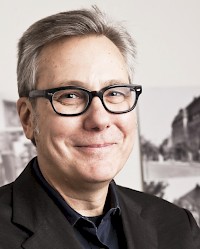Vita
Having taught at Yale University until 1991, Rodowick began the film studies program there. After studying cinema and comparative literature at the University of Texas, Austin, and Université de Paris 3, he obtained a Ph.D. at the University of Iowa in 1983. Rodowick subsequently taught at the University of Rochester and at King's College, University of London, where he founded the film studies program and the Film Study Center. Rodowick has also been an award-winning experimental filmmaker and video artist. In 2002, he was named an Academy Film Scholar by the Academy of Motion Picture Arts and Sciences. He is also Director of Graduate Studies for Film and Visual Studies, at Harvard University.
Dated from 2010
Fields of research
Special research interests include aesthetics and the philosophy of art, the history of film theory, philosophical approaches to contemporary art and culture, and the impact of new technologies on contemporary society.
IKKM Research Project
An Elegy for Theory
An Elegy for Theory examines critically and historically what theory means for the arts and humanities, and why and how it has become a contested concept over the past twenty years. The project takes the fate of theory in cinema studies as exemplary of the more general contestation of theory in the arts and humanities.
Part I comprises a genealogical reflection on theory in general, and in the philosophy of art and aesthetics in particular, as a way of restoring conceptual precision to its range of connotations and semantic values. In the course of centuries, theory has been a highly variable concept. On finds the noble origins of theory in the Greek sense of theoria as viewing, speculation, or the contemplative life. For the Greeks, theory was not only an activity, but also an ethos that associated love of wisdom with a style of life or mode of existence. Linked etymologically to theater and to spectating, no doubt it was inevitable that the young medium of film should call for theory. Part I continues and concludes by exploring the multiple senses of theory as deployed in 18th and 19th century investigations of the aesthetic.
Part II sketches out a more precise historical picture of what has been called film theory since the beginning of the 20th century. This overview then leads to the current “metatheoretical” phase of crisis and self-inquiry, wherein not only the domain of film theory but also the disciplinary status of film studies itself becomes subject to debate in various works that examine historically and reflexively what film theory is or has been. This part concludes with a critical examination of the contestations of theory in film studies specifically and the humanities in general over the past twenty years as a triple displacement of theory by history, science, and finally, philosophy.
Part III explores what a (film) philosophy of the humanities might look like. This discussion is framed by some of the most difficult questions raised by the later writings of Wittgenstein. To what extent is the enterprise of theory still possible? And how might we return to philosophy the specificity of its activity? I will explore these questions in discussing two contemporary philosophers as exemplars of the twinned projects of ethical and epistemological evaluation: Gilles Deleuze and Stanley Cavell. The section on Gilles Deleuze closely examines The Movement-Image and The Time-Image, as well as his last book with Félix Guattari, What is Philosophy? The problem confronted in What is Philosophy? is knowing how philosophical expression differs from artistic or scientific expression yet remains in dialogue with them. Art provides important answers to this question, and here I will return to a key problem of Deleuze’s cinema books: the relation of concepts to ideas, signs, and images. That art may be considered philosophical expression is an important link between Deleuze and Cavell’s interest in film. Like Deleuze, Cavell’s cinema books are not studies of film but rather philosophical studies, which nonetheless are deeply aware of how cinema has penetrated the daily life of the mind in the 20th century. In this respect, cinema is already philosophy, and a philosophy intimately connected to our everyday life.In concluding An Elegy for Theory, I present Cavell’s work as exemplary of a philosophy of and for the humanities, particularly in his original attempt to balance the concerns of epistemology and ethics and to reconsider the relation between art and ethical evaluation.
Publications
The Virtual Life of Film, Cambridge, MA: Harvard University Press, 2007.
»Politics, Theory and the Avant-Garde«, in: Danino, Nina/Maziere, Michael (ed.): The Undercut Reader: Critical Writings on Artist's Film and Video. London: Wallflower, 2003, 34-37.
Reading the Figural, or, Philosophy after the New Media, Durham: Duke University Press, 2001.
Gilles Deleuze's Time Machine, Durham: Duke University Press, 1997.
The Difficulty of Difference: Psychoanalysis, Sexual Difference, and Film Theory, New York, NY: Routledge, 1991.
Crisis of Political Modernism: Criticism and Ideology in Contemporary Film Theory, Urbana: University of Illinois Press, 1989; 2nd edition, Berkeley, CA: University of California Press, 1994.
